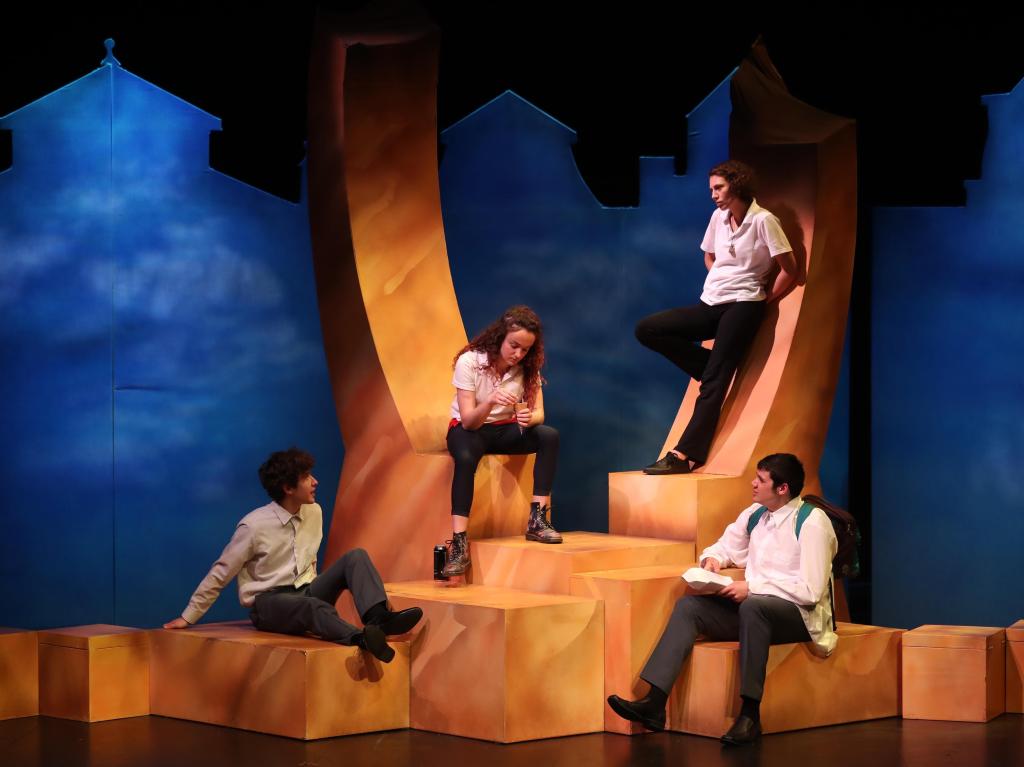ATYP’s Jack Walton, Jayla-Shaoe Davey, Madelaine Osborn and Janda Nichols in The Climbing Tree.
The Climbing Tree is a significant original play developed by Rachael Coopes over a four-year period. It contemplates the power of place, specifically Bathurst, as a sphere that both fosters and challenges identity. This theme, poignantly dramatised through four teenage characters – Kylie (Jayla-Shae Davey), Rayleen (Madelaine Osborn), Scott (Janda Nichols) and Will (Jack Walton) – also addresses the elasticity of place as an invisible sphere of memory, nostalgia, and even, trauma.
The Climbing Tree moves seamlessly between the past and the present, grappling with past crimes perpetrated against the regions Wiradjuri peoples as well evoking the violent history of Bathurst’s Colonial settlement. As such these four actors assume other identities and voices throughout the drama including disenfranchised Irish convicts.
Supporting these characters is a clever set design where sandstone-coloured blocks and cloud-like architectural shapes represent Bathurst’s mixture of rural and structural landscape. The music is especially impressive, with Tim Hansen creating a mood that evokes the experimental style of The Necks, arguably-Australia’s best improvising trio. Hansen’s sound design is especially important to the aestheticism and thematic of A Climbing Tree as a play that addresses our-often conflicted connection to place.
In light of this, The Climbing Tree is also about haunting and being haunted and this is enacted through sounds and names that summon historical events and individuals who have come to shape the unique town and surrounds of Bathurst. For example, the famed ‘Ribbon Gang’ are recalled, where convict Ralph Enwistle led a group who pillaged farms and liberated other convicts. Eventually caught and convicted, he and many offenders were publicly hanged in Bathurst. What remains of this unprecedented execution is a street called ‘Ribbon Gang Lane’ and it is acknowledged in The Climbing Tree as the site near the Church Bar pizza restaurant. This overlapping of the past and present reveals our strange, even uncomfortable relationship to history.
Cleverly, the play is also experienced as a ghost story. One of its climactic scenes features the four leads in a spooky Georgian attic, where they imagine the lives of deceased relatives whilst also experimenting with sex, alcohol and drugs. The coexistence of the past and the present in The Climbing Tree is also about how white and non-white history is both inscribed and buried. For example, Bathurst’s Mount Panorama is mentioned not as the famed racing site, but as a sacred Wiradjuri location that for thousands of years has been named ‘Wahluu’ (a place where young men are initiated). Such a reminder of the land’s ancient heritage reminds us of the extensive ‘white-washing’ of the continent, with numerous sacred sites being appropriated for white consumption.

ATYP’s Janda Nichols, Jayla-Shae Davey, Jack Walton and Madelaine Osborn in The Climbing Tree.
Importantly the play features Indigenous characters who are also First Nation peoples – ‘Scott’ played by Janda Nichols who a Gamilaraay man, and ‘Kylie’ played by Jayla-Shae Davey who is a Miriwoong actor. They bring a level authenticity and gravity to a drama that grapples with the difficult relationship between white and Indigenous Australians. Kylie and Rayleen often refer to this as the ‘us and them’ mentality.
This binary of ‘us’ versus ‘them’ is not only about a continuing division between white and non-white Australia; it also includes the experience of being a Bathurstian teenager who feels ‘really lonely’. However, there is respite for the Bathurst four – Kylie, Rayleen, Scott and Will – who embrace the open spaces and beloved sites of the town’s Machattie Park, duck pond, local ice-creamery and its ‘climbing tree’– a cherished sapling located in Kings Parade.
The Climbing Tree dramatises a conflicted relationship to Bathurst that is articulated through teenage and historical angst. Such conflict is also experienced as a tension between place and a lack of place that is never quite resolved. In this way, The Climbing Tree reveals the complex nature of our existence where emotion and memory are often powerful expressions of a struggling need to belong. Moreover, belonging is not necessarily achieved through connecting with material things and visible places, but rather-with ideas, sensations and memories.
The Climbing Tree is a very sensory, touching and poignant drama about Bathurst as both a material and imaginative sphere. It is a complex and profound play that is not to be missed. The Climbing Tree is due to be performed at the Lennox Theatre, Parramatta, Thursday November 22 until Saturday November 24.
5 stars ★★★★★
The Climbing Tree
Presented by Australian Theatre for Young People in partnership with the Bathurst Memorial Entertainment Centre
Script: Rachael Coopes
Music: Guy Webster
Director: Stephen Champion
Dramaturg: Fraser Corfield
Designer: Karl Shead
Lighting Designer: Bannon Rees
Producer: Kylie Shead
Stage Manager: Heidi Annand
Intern ASM & Design Assistant: Greggryn Holgate-Gorton
Cast
Kylie: Jayla-Shae Davey
Rayleen: Madelaine Osborn
Scott: Janda Nichols
Will: Jack Walton
Authority/Musician: Tim Hansen
31 October – 21 November 2018
Bathurst Memorial Entertainment Centre
22-24 November 2018
Riverside Theatres Parramatta





